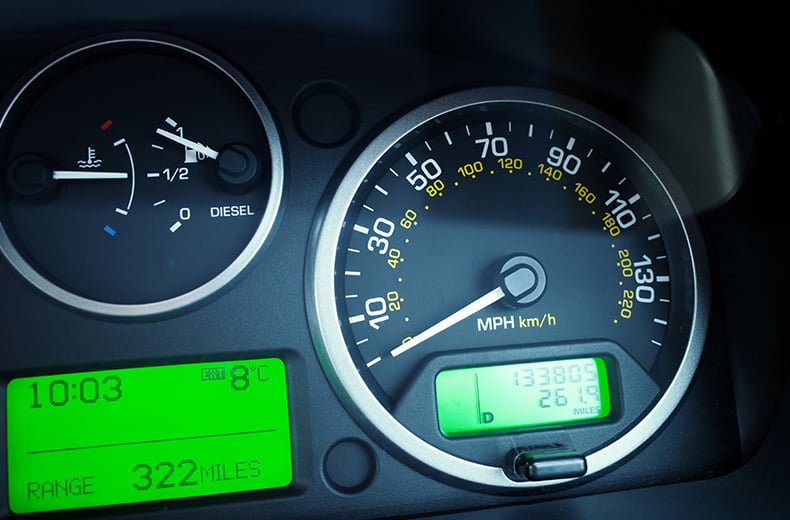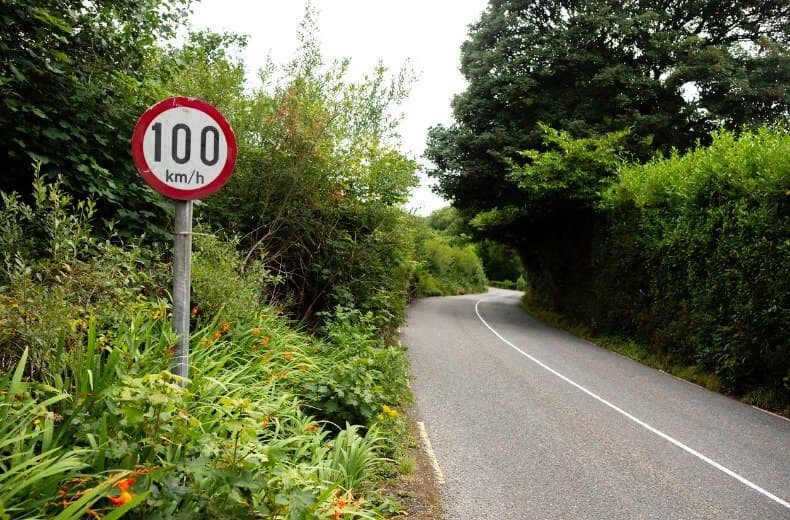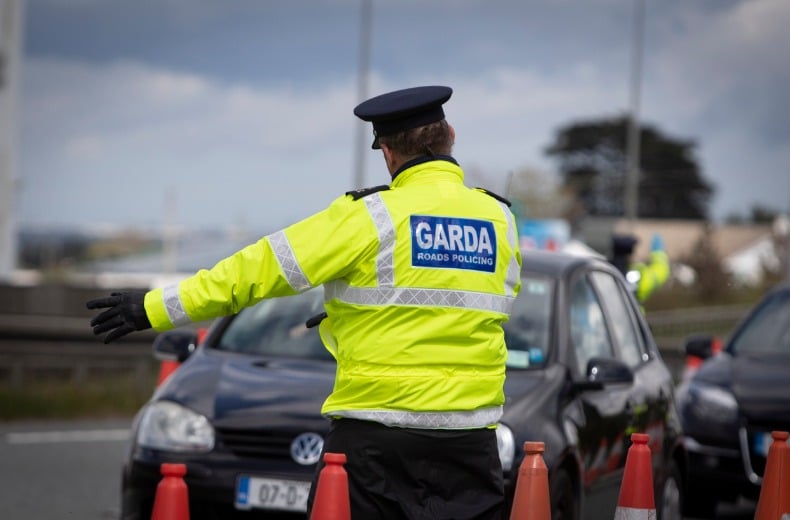Here, we take you through speed limits on different roads, speed limits at different times of day and what to expect if you’re caught speeding.
Read our latest driving in Europe guide below.
Irish speed limits: the law

First things first: Irish speed limits are given in kilometres per hour (kph) so if you’re used to measuring your speed in miles per hour (mph), you’ll need to convert numbers on road signs into something more meaningful. Your speedometer should have both numbers marked, usually in another colour and on the inside of the semicircle.
Thankfully, there shouldn’t be any confusion about what a speed limit sign looks like, as most of them are almost identical to road signs in the UK.
Another useful point to remember is that speed camera detectors are illegal. You should turn off any camera detection features on mobile apps and leave speed detection devices at home to avoid any punishments from the Garda (Irish police force).1
Irish speed limits for different roads
| Type of road | Speed limit |
|---|---|
| Motorway | 120 kph (74 mph) |
| National roads (primary and secondary) | 100 kph (62 mph) |
| Non-national roads (regional and local) | 60 kph (37 mph) |
| Roads in built-up areas (e.g. cities and towns) | 50kph (31 mph) |
| Special. speed limits for densely populated areas | 30 kph (18 mph) |
In 2025, many speed limits in Ireland will be reduced. The first change happened on February 7th 2025 and affects rural local roads. This is because the default speed limit on rural local roads was reduced from 80kph to 60kph. The rural speed limit sign will indicate a limit of 60kph, and this sign is a white circle with five diagonal black lines with another plate that states 'Go Mall (Slow)'.
Later in 2025, more reductions to speed limits will come in. These include a drop to the speed limit in ‘urban cores’ to 30kph. According to Irish Citizens Information, urban cores include built up areas, housing estates and town centres.
Finally, the speed limit on national secondary roads will reduce from 100kph to 80kph. No date is confirmed as of date of publication.
There are also different speed limits for different types of vehicles. The 80kph (49mph) limit for any vehicle towing a trailer or caravan is probably the most relevant for drivers visiting from the UK.
If you’re towing a trailer or caravan through Ireland, you should never exceed the 80kph (49mph) limit even when travelling on motorways and national roads.
Special speed limits may also apply:
- at different times of day
- on different sides of a dual carriageway
- on particular sections of road, for example, in a tunnel where a lane must be closed
- where there are a series of bends
- at roadworks

Instant cover available
• 24/7 rescue at the roadside
• Help to get home if your vehicle can't be fixed
• 5 star Defaqto rated cover

Types of speed limits in Ireland

Motorway speed limits in Ireland
You should never exceed 120 kph (74 mph) when travelling on Irish motorways and remember, if you’re towing a trailer or caravan this limit is reduced to 80 kph (49mph).
There may be times when you’re asked to drive at slower speeds, especially when approaching and driving through roadworks. Be careful and look out for roadside signs and information on gantries for any changes in speed limits that you’ll need to stick to.
The Road Safety Authority (RSA) recommend that you abide by the two-second rule to ensure you keep a safe stopping distance from vehicles in front of you.
This means keeping two seconds away from vehicles in front in good driving conditions and doubling the distance when the road surface is wet. You can even try saying ‘Only a fool breaks the two-second rule’ twice in your head as the car in front of you passes a fixed point, like a sign. If you pass the same fixed point before you’ve finished saying it, you’re too close.
For more extreme weather conditions, it's advised to repeat the saying four or five times instead.
National speed limits in Ireland
National speed limits work slightly differently in Ireland. There’s a difference between speed limits on national roads and the speed indicated by the ‘national speed limit’ road sign:
- speed limit on national roads: 100 kph (62 mph)
- national speed limit: 80 kph (49mph)
The ‘national speed limit’ sign is almost identical to the one in the UK except that it uses a series of diagonal stripes on a white circle rather than the single black stripe that we’re used to.
Special speed limits in Ireland
Slower speed limits may be set by local authorities on roads in densely populated areas or outside schools. Keep an eye out for signs.
Periodic speed limits in Ireland
Although most speed limits in Ireland apply 24 hours a day, some local authorities may enforce limits between certain time periods and different days of the week. For example, you might find that a 30kph (18mph) limit applies Monday to Friday close to some schools.
The periodic speed limits are displayed in one of two ways:
- a standard road sign with an information plate giving details of when the temporary rules apply.
- an electronic sign which only lights up when the periodic limit applies. This may also feature two flashing amber lights.
Speeding fines in Ireland

If you’re caught speeding in Ireland, you’ll face an €160 fine and three points on your licence. You’ll have 28 days to pay the fine before it increases to €240 and a possible five points on your licence.
If you fail to pay the fine after another 28 days and you’re convicted for speeding in court, you could face a maximum fine of €1,000.
Speed limits in Ireland - FAQs
- Are you allowed to drive 10% over the speed limit in Ireland?
Although police officers in the UK are advised to take enforcement action when speed limits are exceeded by 10% plus 2mph, there isn’t any firm evidence that a similar discretion applies in Ireland.
- How much is a speeding ticket in Ireland?
Speeding tickets in Ireland fine drivers €160 and increase to €240 after 28 days. If you fail to pay the fine after another 28 days and you’re convicted for speeding in court, you could face a maximum fine of €1,000.
- How long do speeding fines take to arrive in Ireland?
Speeding fines and penalty points are issued to drivers by post. They should arrive at a driver’s address well before the 28-day payment deadline. Typically, they arrive within 14 days of the offence.
- Are there minimum speed limits in Ireland?
According to the Road Safety Authority’s ‘Rules of the Road’ there doesn’t appear to be a minimum speed limit.
Some counties require that tractors can reach a minimum speed of 50 kph (31 mph) on the motorway but this shouldn’t affect the average driver from the UK.
- What is the national speed limit in Ireland?
A national speed limit in Ireland could refer to the:
- speed limit on national roads: 100 kph (62 mph)
- national speed limit: 80 kph (49mph)
The maximum speed limit of 120 kph (74 mph) applies on motorways only. Rules are due to change in 2025.

Instant cover available
• 24/7 rescue at the roadside
• Help to get home if your vehicle can't be fixed
• 5 Star Defaqto rated cover











